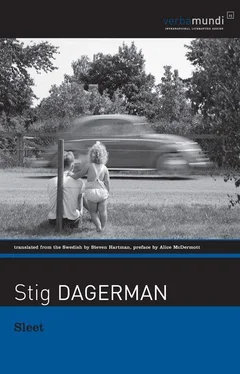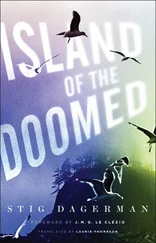It must have happened just before we were about to stand up for prayers. I was sitting there looking at Mr. Lind, thinking to myself: “If there really is a God, I bet Mr. Lind stands there and talks to him.” And then suddenly I felt an elbow nudging mine gently. Just once at first, and then again. So it wasn’t a random thing — it was a signal. I turned my head slowly to the left and looked at Ekman.
He wanted me to see something there in his lap. It didn’t look like much: just a little brown wallet or something resting on his pant leg, no bigger than his two palms opened side by side. Didn’t seem like anything to get excited about. I was about to turn away when I noticed Ekman’s hands starting to quiver just a little, the way they did whenever he was about to do something with them. So I stuck with him and watched his fingers tremble in anticipation as they began to open the little wallet. And what do you know! It wasn’t a wallet after all. It was a little brown and gray chess board, with tiny slots in the squares for the pieces to fit into, miniature painted figurines on little celluloid pegs.
I could tell he was waiting for me to take up the chess set and run my hands over it in admiration. So I lifted it carefully out of his hands as we stood up from our benches. And as the “Our Father” ascended up to the ceiling, if not quite to His heavenly kingdom, I let my fingers play over the pieces, from the kings’ wide crowns to the bishops’ crosses to the rooks’ sturdy battlements. And the whole time I could feel — right through my drowsiness, right through the icy light and the organ tones and the “Our Father” — that I was in the presence of a friend. Like a source of warmth emanating from my left.
Our first subject that morning was history, with Mr. Lind. We spent that year in what they called the Flower Room, an odd-shaped classroom right across from the auditorium. It was narrow like a hallway, with our eight desks lined up side by side along one of the long walls. The teacher’s desk was on a small platform along the opposite wall. Behind it, covering the whole wall, hung a painting depicting a small gathering of girls in long white dresses picking flowers on a meadow in full bloom and fashioning wreaths from the flowers. We always felt a bit sheepish looking at that painting, since it seemed to show a very private scene. They were picking flowers for each other, not for the eight of us going through our first year in the three-year classical studies line. But there they sat before us, tarrying in the tall grass among the flowers, fashioning wreaths for each other’s coffins as they longed for old age.
It was cold that morning, heavy snow swirling outside the windows. The lamp overhead shone like a sun above the meadow scene, but a chill permeated the room. The classroom door was wide open. Students from the writing class were making a lot of noise out under the columns, while the steps of stragglers arriving late to class echoed in the stairwell. The air was thick with the smell of chalk. Our wooden benches were very hard. We were waking up. I hadn’t gotten around to giving the pocket-chess set back to Ekman yet. I set it on my desk and started putting all the chess pieces in their proper positions just for something to do. As I was finishing up Mr. Lind came into the classroom.
As usual, he entered the class quietly and hastily. With a perfunctory nod to the rest of us, he stepped up to the desk and took up the class roster. A few moments later he was down in front again, standing before us with his right hand fingering his chin. He always appeared to be dressed for mourning, his faint smile forever tempered by a look of melancholy, as if he’d recently lost a close relative. That’s how he looked now as he turned to me, with an expression both slightly embarrassed and a little sad.
“Today,” he said. “We’re going to talk a little about the decline of monarchy.”
Talk a little . That was Lind in a nutshell. Where other teachers interrogated or browbeat us, he talked with us. He talked us through the history of the world in a voice that was never raised nor tinged with disbelief at our ignorance. It was as if he considered anything plausible, be it the evils of human history or our own immeasurable stupidity. That’s why we never feared him as we did the other teachers, why instead we respected him as we did no one else. I think he was actually the very first one to teach us that fear and respect were not one and the same but actually each other’s opposite.
Still, even Lind had one person who was afraid of him. And this person feared him because he feared everybody. Everybody and everything. Most of all, he probably feared himself. This person was none other than the kid who sat next to me, my friend Ekman.
But Ekman wasn’t always my friend. He wasn’t now, for instance. He wasn’t a friend of mine before class, and especially not during class. I would watch him from the side, though he never noticed. The only thing he ever noticed was the open book in front of him, today turned to the French Revolution. He always did his homework except when his anxieties got the better of him. He always knew what he was supposed to know, and yet he always doubted himself. I would sit there beside him as I was doing now, witnessing the terror he could work himself into, and the spectacle was enough to make my blood run cold. Suddenly I couldn’t stand him. I felt hurt somehow, betrayed in some strange way. And so the pocket chess set was instantly forgotten, just a dead clump of lead packed away in my pocket.
As he did every morning, Mr. Lind began by strolling around the room. He rarely sat down during our lessons. Instead he would pace back and forth, back and forth, between the door and the window at the far end of the room, taking the least direct path possible. It was curiously soothing, as if he were taking us on a recreational outing. With his hands thrust down deep into his pockets and his sad gaze sweeping over us like an extended wing, he would direct his disconsolate commentary at us like a man preoccupied with a heavy burden, as if consoling the world for its history. At every other turn around the room, he would pause in front of someone’s desk, not for the purpose of testing our attentiveness, but to give us a chance to voice our own views. And without really realizing how, we were drawn out of our holes and into the open air. Emboldened and intoxicated by the rare liberty he offered us, we met him where he wanted us to meet him: in a forest where ideas were to be discovered and prized, like orchids.
There was only one of us he never met there, only one he could never coax out of his hole, for the simple reason that he feared everything, even freedom. That was Ekman, of course, the friend whom I counted as a friend when he was not afraid, and that was seldom.
Mr. Lind always came to Ekman last of all. And I thought I knew why: because Lind was afraid of him. At the end, when the only turn remaining was Ekman’s, Mr. Lind would always go up and sit down behind his desk, as if he were seeking refuge from something. He would sit there in silence for a long moment, looking out the window, before he eventually began a ritual that vaguely resembled a quiz, a few embarrassing little questions that Ekman would answer in a voice trembling with terror, always quoting the text book. He knew it by rote, the way a prisoner knows every inch of his cell. During other lessons with other teachers Ekman was a source of relief for the rest of us. We only needed to look at him to quell our own terror. His handicap was a source of strength for the rest of us. But in Mr. Lind’s class we despised him.
This morning’s lesson reached that inevitable point and as Mr. Lind took his place behind the desk, Ekman’s delicate face turned sheet-white, as always. Mr. Lind sat quietly for a moment, looking down at his hands on the desk before him. Then he turned his head and looked out at the falling snow, finally saying in a low tone:
Читать дальше












